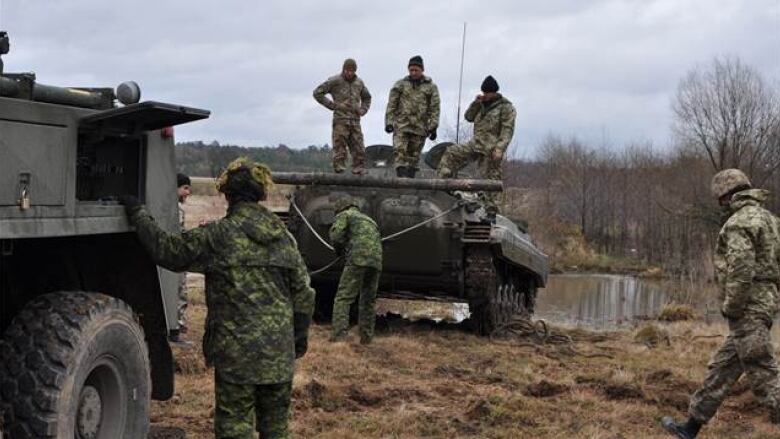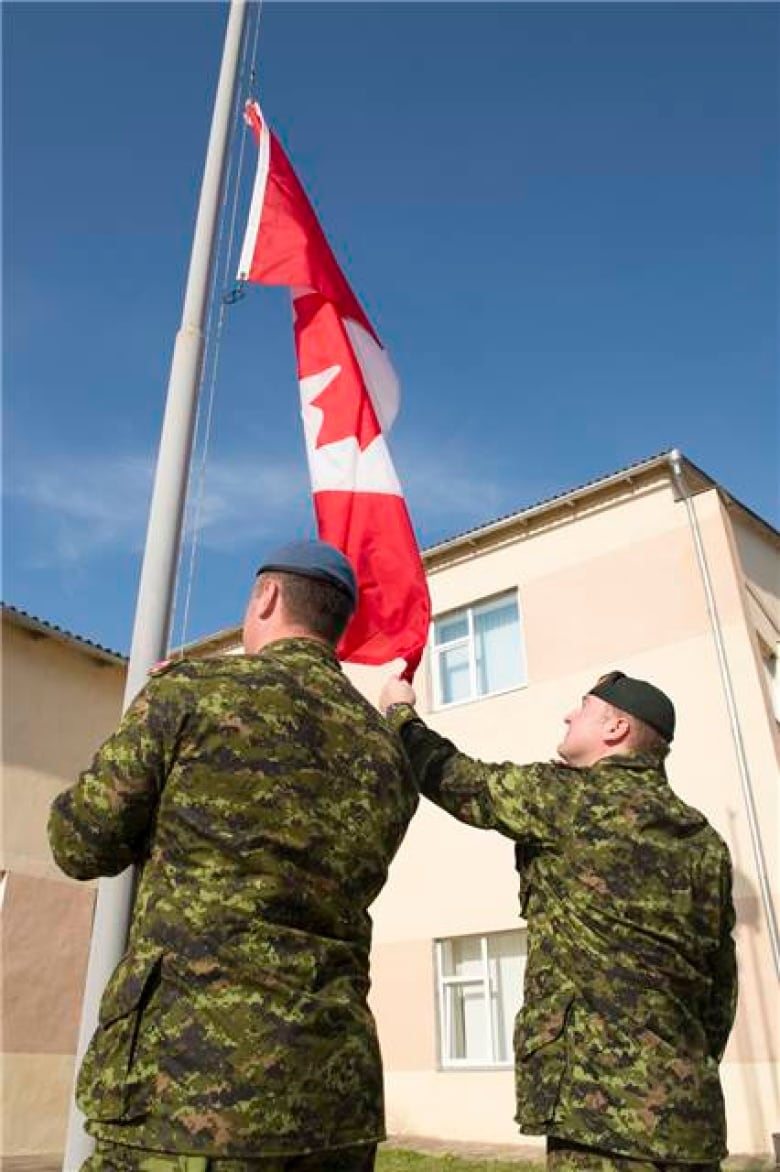'Quite a formidable foe' Ukraine facing: Canadian training commander
From IEDs and tanks to drones and cyber-warfare, Russian-backed rebel insurgency a 'hybrid war'

They are not at the front lines of the war in eastern Ukraine, not even close. But the commander of Canada's training mission in the western part of the country feels that his team is having "a profound impact" on the culture and professionalism of the Ukrainian army.
"We really established our credibility as instructors, and I think that helped sort out any doubts they may have had about what the Canadian Army could offer them,"Lt.-Col. JasonGuineytold CBCThursday.
At first there was resistance, he said, with veteran Ukrainian military officers wondering how Canada's experience in Afghanistan related to the rebel war along that country's eastern border with Russia.
"This is not Afghanistan, it's a much more hybrid war; a mixture of everything from insurgency, roadside bombs, conventional tactics, cyber-electronic warfare, so it's a quite a formidable foe they are facing there,"saidGuiney.

In return, though, theUkrainians are also teaching Canada about that kind of multifaceted war.
"They are quite open about the use of drones, radio jamming, modern tanks. These are lessons we didn't learn in Afghanistan, and very valuable lessons for our own army," he said.
OperationUnifier began in September last year after Canada committed 200 soldiers and officersto help build and modernize the Ukrainian army.
The first rotation from the 1st Battalion Royal Canadian Regiment fromPetawawa, Ont.,wraps up its five-month deployment this week. A second team, mostly from the 3rd Battalion Royal 22e Regiment based in Valcartier, Que., arrives next Monday. The mission is supposed to last until March 2017.
Fighting continues
Officially, a ceasefire is supposed to be in effect in the Donbass region of easternUkraine, where Russian-backed separatists control much of the area.
But fighting continues to flare up, including a powerful explosionin the centre of Donetsk, one of the largest cities in the region,on Dec. 21.
Over 9,000 people, both military and civilians, have died during the almost two years of conflict, according to the UN.
"We are training a mixture of combat-experienced infantry, who have just rotated out of Donbass, and veterans who were trained years agobut have been brought back into the army,"saidGuiney.
A 55-day training course takes soldiers through basic rifle shooting and combat first aidto company-level mechanized tactics.
More senior level training focuses on engineering, military policingand countering IEDs, improvised explosive devices.
Canada has supplied $3.5 million worth of counter-IED equipment,some of which is being used now in easternUkraine. Since January 2014, there have been over 500 IED incidents across Ukraine, according to Guiney.
Casualties high
The Ukrainian army has suffered a large number of casualties since the conflict started in March 2014. The Ukraine army is operating with old, Soviet-style equipment, which is not a match for the newer Russian-supplied weaponry used by the separatists.
In a twist ofhistory, much of Ukraine's army was trained by the Soviets before the breakup of the Soviet Union in 1991.
The training facility in Starychi, where the Canadians are based, has changed its name to the International Peacekeeping and Security Centre, but it used to be a Soviet training base.
Guiney saidmuch of what he deems successful has been convincing Ukraine's senior military leadership to consider changes to its"top heavy military structure," where the decision-making is left to only the highest levels.
"They have a dated military culture,"he said. They've been able to see "how we delegate responsibility and authority" further down the ranks.
A lieutenant-colonelwho served in Afghanistan and also on several peacekeepingmissions in East Africa and Haiti,Guiney describes this experience as "kind of surreal."
"When I joined the army, it was post-Cold War, but we were still training against WarsawPact tactics. We studied their doctrine, their vehicles and now we are working with that kind of equipment."












_(720p).jpg)


 OFFICIAL HD MUSIC VIDEO.jpg)
.jpg)



























































































